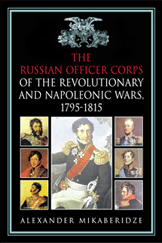The Russian Officer Corps of Revolutionary and
Napoleonic Wars
By
Alexander Mikaberidze
Foreword by Donald Horward
 English-speaking
students of the Napoleonic Wars are blessed, for there is a massive
wealth of books that allows them to look at and read about almost
every aspect of the clash between Britain and France. English-speaking
students of the Napoleonic Wars are blessed, for there is a massive
wealth of books that allows them to look at and read about almost
every aspect of the clash between Britain and France.
When
it comes to finding books about other opponents of Revolutionary
and Napoleonic France - the Prussians, Austrians and Russians -
the pickings are much harder to come by if you don't speak German
or Russian.
And
considering the size of their forces ranged against Napoleon Bonaparte
we are missing out on a huge amount of the 20-year conflict.
Fortunately
one scholar, Dr Alexander Mikaberidze, has done English speakers
a great service by researching and writing The Russian Officer
Corps of the Revolutionary and Napoleonic Wars, 1792 to 1815.
It's
a big title - 534 pages long - and is an even bigger treasure for
anyone interested in those who commanded the Russian armies.
Mikaberidze
has put together 800 detailed biographies, with 440 portraits, of
the senior Russian soldiers of the period. Now I have to say that
it is not like other military Who's Who books in that most
of the fellows included are not household names - even in my reference
library.
You
can't just pick up The Russian Officer Corps of the Revolutionary
and Napoleonic Wars, 1792 to 1815 and thumb through to someone
you have heard of many times before (obviously excluding Kutusov,
Suvarov, Bagration and so on...) and that's the beauty of the work
in that it offers a trove of fabulous new information for Napoleonic
students.
Wargamers
using Russian armies will also find the book extremely useful as
they will help put faces and characters behind the commanders of
units.
But
The Russian Officer Corps of the Revolutionary and Napoleonic
Wars, 1792 to 1815 is not just biographies, Mikaberidze has
also included more than 50 pages of fabulous information that gives
an insightful overview of Russian officers.
He
looks at how Peter the Great created a modern officer corps system
that began with foreign mercenaries and how it was changed into
one dominated by Russians - particularly the cavalry.
But
foreign influence was still there during the Napoleonic Wars and
the split between "Russian" leaders and so-called "Germans"
- like Barclay de Tolly - could have spelt disaster during the 1812
invasion by Napoleon.
As
with other European armies nobles made up the majority of Russian
officers, but they didn't have it all their own way. They were supposed
to serve as rank and file soldiers to start with - albeit at NCO
rank after three months - and within three years would gain their
commissioned status.
Nobles
came to regard the military as the only profession for them and
those who did not join the army were penalised with a loss of voting
rights.
They
were often heavy drinkers and even heavier gamblers. General Mikhail
Vorontsov owed more than 65,000 rubles to General Dokhturov and
62,000 more to another general.
General
Peter Bagration owed more than 80,000 rubles and was forced to sell
his estates to make good the debts.
Other
areas The Russian Officer Corps of the Revolutionary and Napoleonic
Wars, 1792 to 1815 detail are education levels, ranks, military
honours, ownership of lands and serfs, as well as a breakdown of
the social composition of the corps.
The
Russian Officer Corps of the Revolutionary and Napoleonic Wars,
1792 to 1815 is a marvellous addition to Napoleonic knowledge
and Alexander Mikaberidze should be exceedingly proud of his efforts.
A
must-have.
-
Richard Moore
9.5/10
Savas
Beatie
(December 2004; ISBN 1-932714-02-2; HC, d.j., 534 pages. $64.95).
|